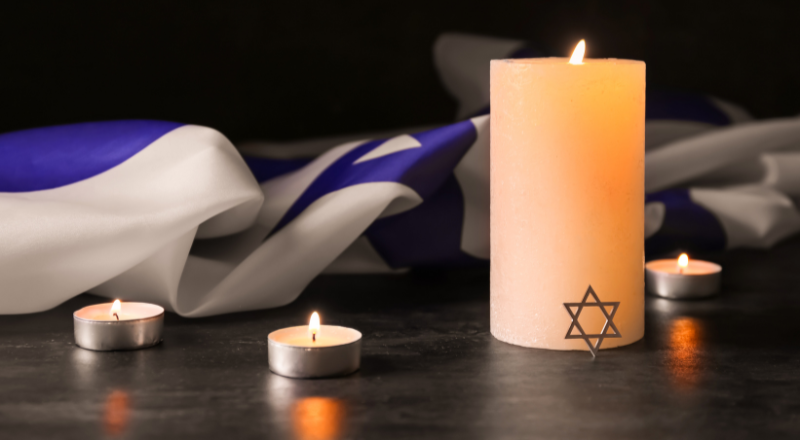by Bat-El Lieberman, Keshet Jewish Enrichment & Culture Facilitator
Let’s talk about memory—or in Hebrew, Zikaron. In Israel, memorial days are called Yom HaZikaron, which literally means “Day of Remembrance.” In English, we usually say Memorial Day, but there’s something about the Hebrew term that invites a deeper, more personal reflection. It’s not just about remembering facts or names—it’s about connecting our hearts and histories to a shared national soul.
And yes, I know I’m being dramatic. I’m Israeli…we feel things loudly.
Now, let’s back up to the Torah. The first Yom Zikaron we meet isn’t about soldiers or tragedy—it’s about Rosh Hashanah, our New Year. But it’s not just a party day with apples and honey. It’s described in the Torah as:
“Zikaron Teruah” — A remembrance of blasts.
דַּבֵּר אֶל־בְּנֵי יִשְׂרָאֵל… זִכְרוֹן תְּרוּעָה מִקְרָא־קֹדֶשׁ (Vayikra 23:24)
A memory of sound. Or more precisely — a memory made by sound.
If you’ve ever been to a synagogue on Rosh Hashanah, you know what I mean. You wait. You fidget. Maybe your legs fall asleep. But then, there comes the sounds of the shofar. And suddenly, you’re five years old again, sitting next to your sibling who pulled your hair during services, watching your rabbi’s baby cry from the bimah, or getting candy from your Savta for staying quiet during that holy moment. It’s Zikaron Teruah—the memory of the blast.
And ironically, a loud, piercing sound is also how Israel marks its most somber days.
On Yom HaShoah (Holocaust Remembrance Day) and Yom HaZikaron (Memorial Day for Israel’s fallen soldiers and victims of terror), a siren sounds across the entire country. It’s not a fancy, musical siren; it’s a long, high, paralyzing wail. And in that moment, everything stops. Cars on highways. Shoppers in malls. Kids in schoolyards. Two minutes of stillness. No notifications. No side conversations. Just silence wrapped around a sound.
It’s dramatic, it’s overwhelming, and it’s unforgettable.
But here’s the real point: it works. That siren creates a collective Zikaron—a shared, embodied memory. And it’s accessible to everyone. If you’re deaf, you see the world stop. If you can’t stand, you pause. If you don’t understand, we teach you. Because in Israel, Zikaron is not something reserved for intellectuals or history buffs. It’s for every ability, every age, and every person.
And that brings me to our work at Keshet, where we support Jewish individuals with disabilities to live full, meaningful lives rooted in tradition, community, and belonging.
This ability to remember is at the heart of everything we try to teach, especially to our individuals with diverse abilities. We teach a skill, a fact, a song—and through reminders, repetition, and practice, we help them remember and refine it. We do this not just to meet IEP goals or check boxes, but to build a Jewish memory, an identity, a Zikaron that lasts.
When I began planning our Yom HaShoah and Yom HaZikaron ceremonies this year, I thought deeply about what kind of experience I wanted to create. In past years, I’d worked in Jewish day schools where we played the siren as a matter of course. But at Keshet, I chose not to.
Why? Because while the siren is powerful, it can also be triggering, especially for individuals who are sensitive to loud sounds or have difficulty processing sudden sensory input. For some, that sound could cause confusion, distress, or anxiety.
And so, I made a different choice. A deliberate one.
I chose not just remembrance, but meaningful remembrance.
Instead of playing the siren, we created ceremonies focused on values, on symbols, and on calm, respectful reflection. We read Yizkor. We talked about what it means to remember. We lit candles. We spoke about peace, hope, courage, and loss—through words and visuals and music that met our individuals where they were.
Our ceremonies were not loud. But they were powerful. Because Zikaron isn’t only about sirens, it’s about what happens after the sound. It’s about what sticks. What gets carried. What lives on. Our ceremonies honor both the past and the future. We present core Israeli and universal values, with hope for peace, while remembering and honoring those who were lost.
You’ll notice our program has no page numbers as you are invited to choose your own order or omit texts as needed. My hope is that through these accessible ceremonies it will help you create a meaningful moment of Zikaron, or remembrance.
And my hope is that these ceremonies planted seeds. That next year, when our individuals see a candle or hear the word Yizkor, they’ll remember this moment. That they’ll feel—in their way—a connection to Jewish history and to the people of Israel.
Because building Jewish memory in people with disabilities isn’t a nice extra—it’s essential. It’s inclusion in its truest form. It says: “You belong to this story. You are part of this people. And your memory matters.”
Download A Copy of the Yom Ha’Shoah (Holocaust Remembrance) Ceremony
Download A Copy of the Yom Ha’Zikaron (Israel Memorial Day) Ceremony

